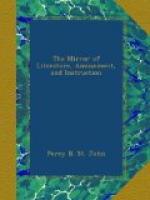Rook-shooting.
“Rooks are not easily induced to forsake the trees on which they have been bred, and which they frequently revisit after the breeding season is over. This is shown in Hampton-Court Park, where there is an extensive rookery amongst the fine lime-trees, and where a barbarous and unnecessary custom prevails of shooting the young rooks. As many as a hundred dozen of them have been killed in one season, and yet the rooks build in the avenue, though there is a corresponding avenue close by, in Bushy Park, which they never frequent, notwithstanding the trees are equally high and equally secure. I never hear the guns go off during this annual slaughter without execrating the practice, and pitying the poor rooks, whose melancholy cries may be heard to a great distance, and some of whom may be seen, exhausted by their fruitless exertions, sitting melancholy on a solitary tree waiting till the sport is over, that they may return and see whether any of the offspring which they have reared with so much care and anxiety are left to them; or, what is more probable, the call for assistance of their young having ceased, they are aware of their fate, and are sitting in mournful contemplation of their loss. This may appear romantic, but it is nevertheless true.”
Who can read the above without a shudder at the brutal taste of the lords of the lower world.
The Emu.
“The only instance I have met with in which the hen bird has not the chief care in hatching and bringing up the young is in the case of the emus at the farm belonging to the Zoological Society near Kingston. A pair of these birds have now five young ones: the female at different times dropped nine eggs in various places in the pen in which she was confined. These were collected in one place by the male, who rolled them gently and carefully along with his beak. He then sat upon them himself, and continued to do so with the utmost assiduity for nine weeks, during which time the female never took his place, nor was he ever observed to leave the nest. When the young were hatched,[4] he alone took charge of them, and has continued to do so ever since, the female not appearing to notice them in any way. On reading this anecdote, many persons would suppose that the female emu was not possessed of that natural affection for its young which other birds have. In order to rescue it from this supposition, I will mention that a female emu belonging to the Duke of Devonshire at Cheswick lately laid some eggs; and as there was no male bird, she collected them together herself and sat upon them.”
[4] There are now (June) five
young emus alive, and appearing
perfectly healthy.
The Toad.




